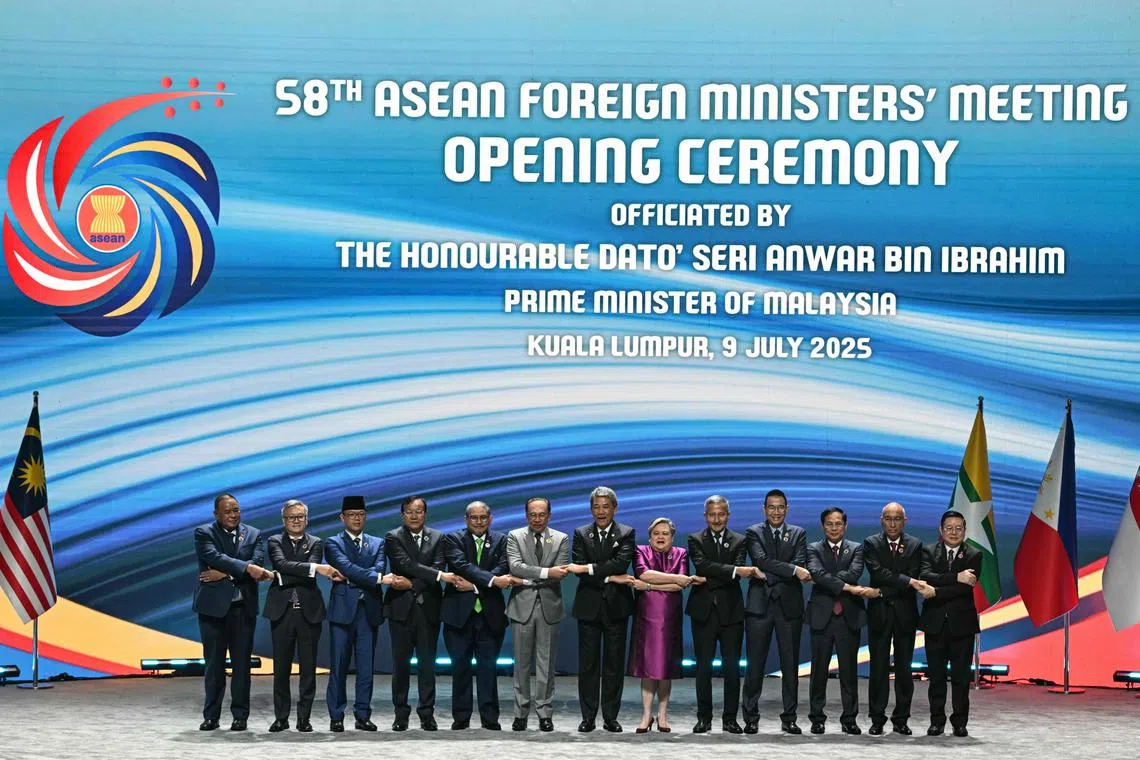Foreign ministers back Timor-Leste entry, push for stronger trade and energy links at Asean meet
Sign up now: Get insights on Asia's fast-moving developments

Asean leaders and foreign ministers also pledged to deepen regional economic integration and energy cooperation at talks in Kuala Lumpur on July 9.
PHOTO: AFP
Follow topic:
- Asean ministers reaffirmed Timor-Leste's membership, set for October, with Singapore supporting development via the Stars package, training hundreds of officials.
- Ministers discussed deepening economic ties through initiatives like upgrading Atiga and Defa, aiming to boost the digital economy to US$2 trillion by 2030.
- Asean committed to an open, rules-based region, accelerating the Asean Power Grid for clean energy, as Malaysia urged enhanced internal trade amid global uncertainty.
AI generated
KUALA LUMPUR – Asean foreign ministers reaffirmed plans to admit Timor-Leste as the grouping’s 11th member, and pledged to deepen regional economic integration and energy cooperation at talks in Kuala Lumpur on July 9.
During the 58th Asean Foreign Ministers’ Meeting (AMM), Foreign Minister Vivian Balakrishnan and his regional counterparts discussed and expressed enthusiasm for Timor-Leste’s upcoming accession to the group, said Singapore’s Ministry of Foreign Affairs (MFA).
The South-east Asian nation of 1.3 million people has been waiting to join the grouping since it formally applied for membership in 2011.
This is due to take place at the 47th Asean Summit in October, following a decision in May to endorse the move in principle.
MFA said that Dr Balakrishnan reaffirmed Singapore’s commitment to support Timor-Leste’s development through capacity-building courses under the Singapore-Timor-Leste Asean Readiness Support (Stars) package and the Singapore Cooperation Programme.
The Stars package, launched in 2022, trains Timor-Leste officials in support of the country’s bid for full Asean membership. Singapore has conducted courses for about 800 officials.
At their meeting, held at the Kuala Lumpur Convention Centre, the Asean ministers had a wide-ranging discussion on deepening Asean’s economic integration, enhancing supply chain resilience, and harnessing the potential of the digital and green economies, MFA said.
The group aims to achieve these goals through initiatives such as the upgrading of the Asean Trade in Goods Agreement (Atiga) and the Digital Economy Framework Agreement (Defa).
The Atiga, a key free trade agreement for the region, was signed in 2009 and came into force a year later. Negotiations to upgrade this agreement were concluded in May.
The Defa was introduced in 2023 to boost the growth of digital trade and services in the region. Studies suggest it could double the projected value of Asean’s digital economy from US$1 trillion (S$1.3 trillion) to US$2 trillion by 2030.
The ministers also agreed on the importance of accelerating the establishment of the Asean Power Grid to advance the region’s clean energy transition efforts and strengthen its collective energy security, said MFA.
“The AMM also reaffirmed Asean’s commitment to uphold an open, inclusive and rules-based regional architecture, including through ongoing efforts to expand and strengthen cooperation with its external partners,” added the ministry.
With Malaysia chairing Asean this year, Prime Minister Anwar Ibrahim on July 9 urged Asean to “act with purpose” and enhance trade among one another in the face of global uncertainty.
In his opening remarks, Datuk Seri Anwar described tariffs, export restrictions and investment barriers as “the sharpened instruments of geopolitical rivalry”. He did not mention the US specifically.
US President Donald Trump on July 8 announced hefty levies of between 25 per cent and 40 per cent on six Asean nations. Singapore has not received any formal notification from the White House.
Mr Anwar said: “As we navigate external pressures, we need to fortify our internal foundations. Trade more among ourselves, invest more in one another, and advance integration across sectors with resolve.
“As global conditions remain uncertain, there is no overstressing the need to act with purpose in our own region.”
US Secretary of State Marco Rubio is set to join the meeting of Asean ministers and other international leaders in KL on July 10.
“In his first trip to Asia as secretary of state, Secretary Rubio is focused on reaffirming the United States’ commitment to advancing a free, open and secure Indo-Pacific region,” US Department of State spokeswoman Tammy Bruce said on July 9.
The MFA also said that Singapore welcomes the signing of the instrument of accession to the Treaty of Amity and Cooperation in South-east Asia by Algeria and Uruguay. This document lays the groundwork for closer ties between the two nations and South-east Asia.
On the sidelines of the meetings in KL, the Asean foreign ministers paid a courtesy call on Mr Anwar. Separately, Dr Balakrishnan also met Norwegian State Secretary for Minister of Foreign Affairs Andreas Motzfeldt Kravik.


